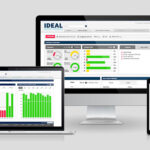Top tips on cash flow management
When it comes to the financial management of your company, cash is king. The period between when you have to pay your suppliers and employees and the time you receive payment from your customers can be a difficult time.
The key to getting through this period is simple cash flow management. At Office Power we support the management of our partners’ cash flow by removing any risk of bad debt and providing full clarity and visibility to the timing of their income. However, if you’re not with Office Power, then here are some of the key areas you should focus on to improve your cash flow:
Keep your eye on the ball
If you can anticipate cash flow for next year, quarter, or even just next week, you will have an accurate forecast that may alert you to a situation well before it strikes.
Cash flow planning is not fortune telling, but educated guesses that balance your customers’ payment histories, your own skill identifying upcoming expenditures, and your vendors’ good nature.
An important part of anticipating accurate cash flow is detailed knowledge of amounts and dates of future cash outlays; knowing when each penny will be spent, and on what. It can be really tough to make predictions, but it’s one of the most important things you can do. Projections rank next to business plans and mission statements among things a business must do to plan for the future.
Improving income
If you got paid for sales the instant you made them, you would never have a cash flow problem, but unfortunately this doesn’t always happen. Here are some tips to improve cash coming in:
- Make sure you have good lines of communication with your customers.
- Run credit checks on all new non cash customers.
- Issue invoices promptly and follow up immediately if payments are slow in coming.
- Identify and avoid slow-paying customers. Maybe offer Cash on Delivery as an alternative to refusing to do business with them.
- Make it easy for customers to pay you by offering a wide range of methods to choose from when settling accounts.
- Set up automated chaser processes where possible.
- Offer discounts to customers who pay their bills rapidly.
- Get rid of old, outdated inventory for whatever you can get.
- Ask new customers to make deposits at the time orders are taken.
Managing outgoings
When you are in charge of a growing company, you have to watch expenses carefully. Here are some tips for using cash wisely:
- Take full advantage of creditor payment terms.
- Use electronic fund transfers to make payments on the last day they are due. You will remain current with suppliers while retaining use of your funds as long as possible.
- Communicate with your suppliers so they know your financial situation. If you ever need to delay a payment, you’ll need their trust and understanding.
- Carefully consider offers of discount for earlier payments. They may amount to expensive loans to your suppliers, but could also provide you with a chance to reduce overall costs. Scrutinise the details.
- Don’t always focus on the lowest price when choosing suppliers. Sometimes more flexible payment terms can improve your cash flow more than a bargain.
Surviving shortfalls
Sooner or later, you may find yourself in a situation where you lack the cash to pay your bills. This doesn’t mean you’re a failure as a businessperson, simply a normal entrepreneur who can’t perfectly predict the future.
The key to managing deficits is to become aware of the problem as early and as accurately as possible. Institutions may be wary of borrowers who have to have money immediately. They’d much prefer helping you out before you become too desperate.
Since it’s far easier to borrow when you don’t need it, arranging a line of credit before the situation is critical is important.
If your bank can’t help, turn to your suppliers. They should be more interested in keeping you going as a customer, and they probably know more about your business. If you’ve been a good customer in the past and kept them informed about your financial situation, you may get extended terms just by asking.
Ask your best customers to accelerate payments, and maybe offer a discount of a percentage point or two off the bill. You can also pressure your worst customers – those whose invoices are way past due – by offering them a steeper discount if they pay today.
Don’t just pay the smallest bills first and let the rest slide. Pay employees soonest, or they will become ex-employees. Pay crucial suppliers next. Ask the rest if you can skip or make a partial payment.
Good cash flow management comes down to maintaining accurate records, enabling you to observe trends and identify areas of concern. Good accounting software is essential in speeding up the process of invoicing, including pursuing payments. It might be advantageous to find a business package that helps you manage and forecast your cash flow as well as stock levels.





